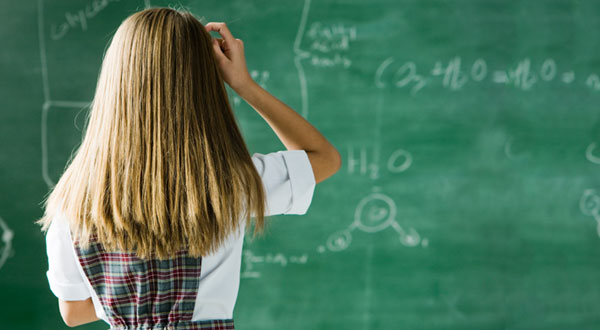Approaches to math education
Traditional versus Discovery math education models at Canadian private schools
Find a list of schools

Traditional Math typically teaches a method or algorithm FIRST, and THEN teaches the applications for the method. Traditional algorithms are emphasized and practiced regularly: repetition and drills are frequently used to ensure foundational mastery in the underlying mathematical procedures. The traditional approach to math views math education as akin to building a logical edifice: each brick depends on the support of the previously laid ones, which represent mastery over a particular procedure or method. Traditional Math begins by giving students a tool, and then challenges students to practice using that tool an applied way, with progressively challenging problems. In this sense Traditional Math aims to establish procedural understanding before conceptual and applied understanding.
Discovery Math turns traditional math on its head: it frequently begins by introducing a novel problem to students, and works its way back to “discovering” a method of solving the problem. The goal is to ground mathematical procedures and algorithms firmly in their applications, and to challenge students to think critically about how they might go about solving the problem right from the beginning. Generally associated with the “Chicago Math” movement and related Everyday Math textbooks (Grades 1 to 6), Discovery math spends less classroom time mastering established algorithms and more time getting students invested in and thinking critically about novel mathematical problems and concepts. In this sense Discovery Math aims to establish conceptual and applied understand before procedural understanding.
These math programs feature an equal balance of “Traditional” and “Discovery” methods. Which, actually, might be the best approach of all.
Kim Langen, CEO of Spirit of Math Programs:
There are many new ideas that have been tried in mathematics education, much of which has been developed to ‘unpack’ the understanding of mathematics, instilling rich experiences into the classroom. Unfortunately, in an attempt to do this, many teachers have focused entirely on activities for learning and creative solutions, without critically examining what outcomes can be used to apply their knowledge to build skill sets. I call this ‘staying in the sandbox without discovering what can be used to build a bigger castle.’
What went wrong was that teachers who went to the extreme of this thinking will not tell kids that they got a wrong answer: they believed that the creative approach was more important than the skills and correct answers. We want our kids to be innovative thinkers, but they also need to be able to use their skills to develop stronger logical thinking skills. Skill development was dropped, and so were the automaticity of basic number facts. Calculators and computers, it was thought, could do all the calculations and processes.
It is clear that skills, automaticity of number facts and processes are needed: however, the innovative, construction of ideas is also needed. Asia and South Asia focus on skills, drills and procedures, and yet, they are looking to North America for their new ideas. They realize that they are skewed in the other direction. What really went wrong is that people in both sides of the world have gone too far in one direction, or another, leaving many good qualities of math education behind.
•
Hanna Gernega, Oxford Learning High Park:
… there is nothing wrong with memorizing the multiplication table. We also tend to rush, and rarely do students stay on the same concept more than two weeks. It is not nearly enough time to learn and apply new knowledge. Each concept needs to be explained with the connection to the real life through problem solving. We need to make sure that previously taught concepts are constantly being used and refreshed while teaching something new. … the countries which do it right, they all have the same approach: teach and practice Math every day for few hours and constantly use and apply it in real life activities.
•
School size matters
How school size impacts the student experience at TCS (April 4, 2024)
La critique de l'éditeur de Our Kids: La Citadelle International Academy.
(March 19, 2024)
Out of the class and into the community
TCS’s service learning program provides the hands-on experience of giving back (February 13, 2024)
The benefits of multilingualism
What language education at Alexander von Humboldt German International School Montreal provides (February 1, 2024)
Profile of Carrie Hughes-Grant, Head of School, Holy Name of Mary College
“It’s all about giving the girls a voice.” (December 14, 2023)